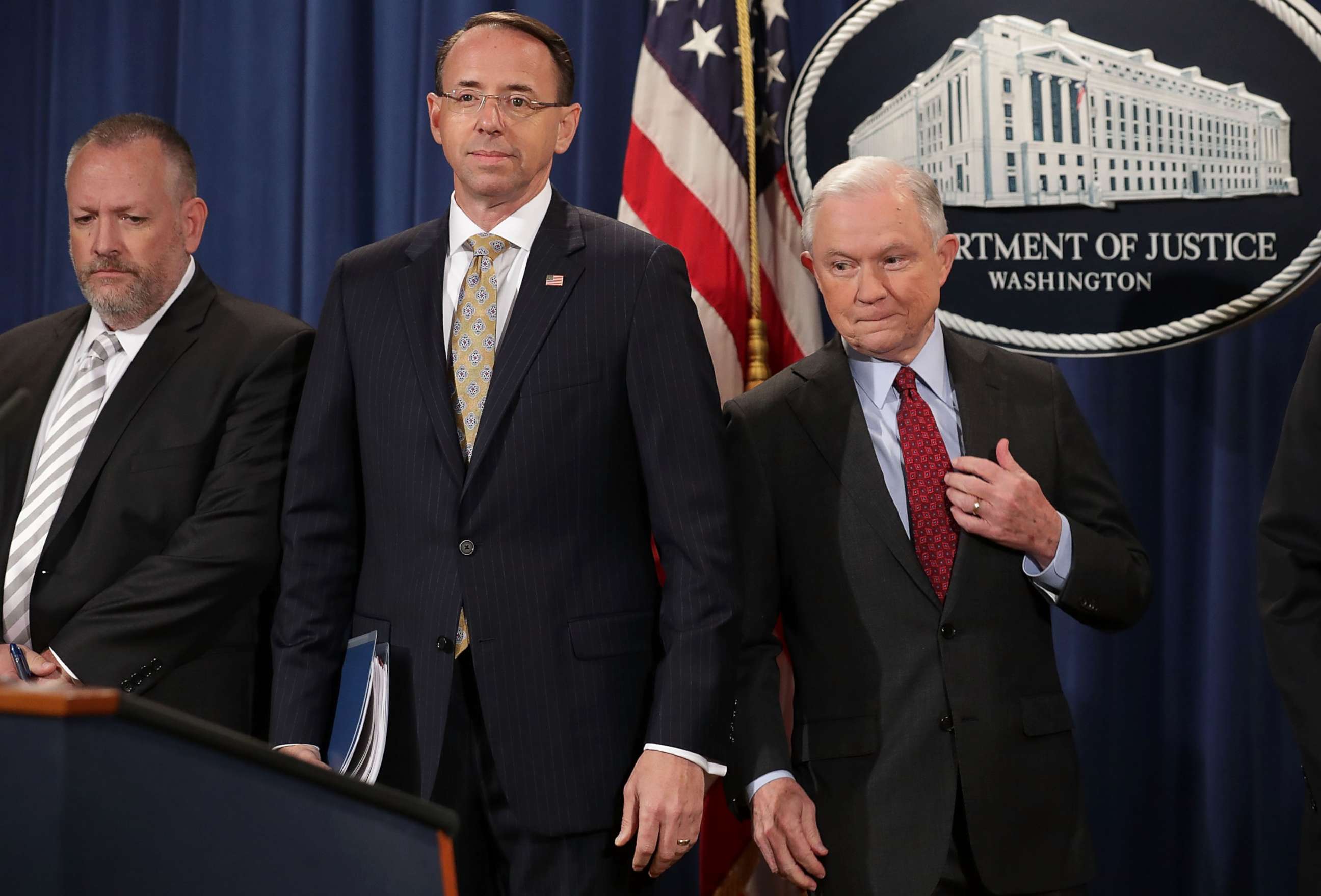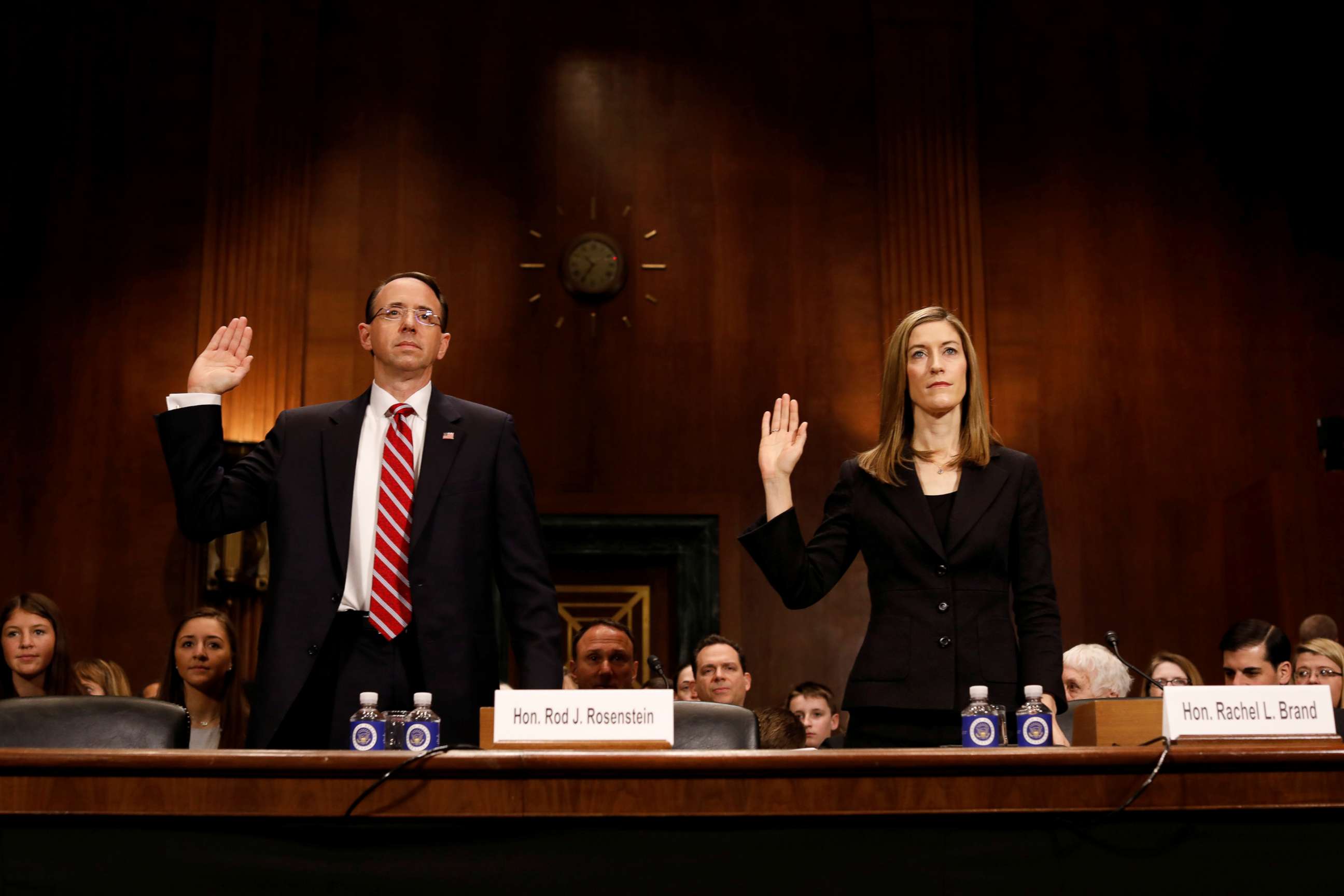Rod Rosenstein: What to know about the deputy attorney general under Sessions
Rosenstein is the second-in-command at the Justice Department.
— -- President Donald Trump’s recent spate of criticism of Attorney General Jeff Sessions has led to speculation that Sessions could resign, thrusting his second-in-command into the spotlight.
Confirmed by the Senate 94-6 with wide bipartisan support, Rod Rosenstein, 52, was sworn in as the 37th deputy attorney general on April 26.
A Philadelphia native, Rosenstein went to the Wharton School of the University of Pennsylvania, also the president’s alma mater, where he earned a Bachelor of Science in economics. The former prosecutor then earned a J.D. at Harvard Law School in 1989. After graduating, he went to work as a law clerk with Judge Douglas H. Ginsburg of the U.S. Court of Appeals for the District of Columbia Circuit.

Rosenstein has predominantly held public positions in his tenure.
Following his stint as a trial attorney with the Justice Department handling political corruption cases, Rosenstein served as counsel to the deputy attorney general from 1993 to 1994 and associate independent counsel from 1995 to 1997 during the Clinton administration.
He was later tapped to join the team of prosecutors working under Kenneth W. Starr, the independent counsel on the Whitewater investigation into then-President Bill Clinton and first lady Hillary Clinton’s real estate investment dealings.
In 2005, President George W. Bush nominated him to be Maryland’s U.S. attorney. Rosenstein stayed in that position for 12 years. He was the only U.S. attorney appointed by Bush who was asked to stay on by President Barack Obama throughout his eight-year term.
Rosenstein's relationship with Trump
In Rosenstein's short time in his role as deputy attorney general, his relationship with the president has been hot and cold.
Rosenstein is perhaps best known as the man behind the memo that Trump initially cited as the reason why he fired FBI Director James Comey in May. Rosenstein sent a memorandum to Trump before the firing, noting that Comey’s public statements and his handling of the FBI's investigation in Hillary Clinton's email server had “damaged public confidence in the bureau and department.”
Following Comey's firing, Trump spoke highly of Rosenstein. "He's ... respected -- very good guy, very smart guy. The Democrats like him. The Republicans like him,” Trump said on May 11, in an interview with NBC’s Lester Holt. (However, Trump later said he would have fired Comey regardless of Rosenstein's memo.)
Shortly after that interview, though, Rosenstein, in his capacity as acting attorney general in campaign-related investigations following Sessions' recusal in March, named Robert Mueller as special counsel to oversee the probe into Russia's election meddling and possible ties to the Trump campaign.

Since then, Trump has begun questioning Rosenstein’s allegiance to his role, particularly after the deputy attorney general appeared before the Senate Appropriations Committee on June 13 and said he didn’t have a “good cause” to potentially fire Mueller and warned if there wasn’t a good cause, “it wouldn’t matter to [him] what anybody [said].”
The appearance came just it was reported that Trump was “weighing the option” of terminating Mueller because he felt Mueller was “conflicted” from representing some Trump family members in the days before his special counsel role. Because of Sessions' recusal, the power to dismiss Mueller lies with Rosenstein.
Trump tweeted out an angry response to Rosenstein's Senate speech on needing "good cause" to fire Mueller three days later, calling the investigation a "witch hunt."
Rosenstein also came under fire in the June hearing for not providing a clear answer as to whether he could become a potential witness in the Russia investigation. Rosenstein said he wouldn’t answer “hypothetical questions,” but sources close to him told ABC News he met with Associate Attorney General Rachel Brand to discuss the possibility of him recusing himself that week.
Then, on June 19, then-White House press secretary Sean Spicer reiterated the president’s support of Rosenstein, saying Trump has “confidence of everyone” in his administration and that Rosenstein “serves in this administration.”
But a month later, in an interview with The New York Times, Trump jabbed Rosenstein once more for appointing Mueller and discounted him as simply a “second man” that Sessions “hardly knew” when he brought him in.
ABC News' Mike Levine, Veronica Stracqualursi, Dylan Wells and Saisha Talwar contributed to this report






